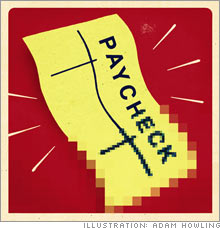The end of the paycheckA new version of direct deposit - for workers who don't have bank accounts - is catching on with small-business bosses.(FSB Magazine) -- It's payday at a Wendy's (Charts) in Wichita, but the teens who flip the burgers aren't lining up to get their checks from the manager's office. In fact, they aren't getting checks at all. Instead, sometime in the next few days they'll simply visit a bank machine and withdraw part or all of their pay using a debit card. It looks and works just like a standard debit card, but there's a twist. Most of the employees using it don't have bank accounts. The card draws on the payroll account of their employer, Wichita-based LDF Cos.
By offering this option to employees at its 44 franchise restaurants and five beer distributorships in three states, LDF has become one of the first small businesses to adopt the payroll system. "We have a lot of employees who are young and 'unbanked,' and thus can't get direct deposit," explains Bill Goodlatte, LDF's senior vice president of human resources. "This is a way for them to get their pay without paying exorbitant check-cashing fees, while allowing us to move toward a paperless office." Paycheck in a 'gift card' Payroll debit cards are a variant of stored-value gift cards. The employer sets up a central payroll account and issues a card to each employee, electronically depositing into the account the amount owed each payday. Employees can access their pay either by withdrawing cash at any ATM or by using the card to make purchases and get cash back. The company's payroll vendor tracks all the debits and credits for each paycard, sends out paper pay stubs and tax forms and provides a way for employees to check their balances either online or by phone. Automatic Data Processing (Charts) (ADP), which handles payroll for one in six employees in the U.S., saw its paycard business triple from 2004 to 2005, says Gary Lott, general manager of ADP's TotalPay Card program. While the cards remain most popular among large corporations, they're making inroads at businesses of all sizes. Last year a survey by the American Payroll Association (americanpayroll.org) found that although only 3 percent of its 22,000 members were currently using paycards, a full 50 percent were considering adopting them. The cost of switching from paper checks to paycards will depend on the payroll system you're using, how many employees you have and how often they're paid, but you're likely to see a speedy return on investment. Paper checks cost $1 to $2 each, while loading a paycard costs about 20 cents. A win-win for business and labor The cards are also far more convenient, especially for business owners who rely on part-time or young employees or workers who have recently immigrated to the U.S. - anyone who might not have a bank account. (About 17 percent of U.S. workers fall into that category.) The cards are as easy to manage electronically as direct deposit, they eliminate the expense of printing and distributing paper checks, and they ensure that everyone gets paid on time and in full - benefits for any growing company. Paycards can also build employee satisfaction and loyalty. They save workers the semi-larcenous 10 percent charged by the typical check-cashing store, are safer than carrying cash and can't get lost in the mail. What's more, they're handy financial-management tools, and not just for unbanked employees. "The longer people have the card, the more they tend to use it as a debit card instead of withdrawing all their pay at once," says Lott. "We're even seeing people with direct deposit asking for a portion of their pay on a card. It gives them more control over their discretionary spending." Still some creases to iron out The technology isn't practical for every business. In a handful of states, including Montana, Vermont and West Virginia, paycards fall into a regulatory gray zone, with laws that neither forbid nor specifically allow them as a substitute for cash or checks, says Kathy Beda, a labor-law specialist who chairs the APA paycard committee. Most state laws also require that employees be allowed to get their entire pay on payday without fees. However, paycard vendors typically allow only one free ATM withdrawal for each pay period, and an employee's pay may exceed the maximum withdrawal amount. So a business may have to cover at least some of those extra ATM withdrawal fees, which would eat into the cost savings. In addition, employees are naturally wary of any change in their pay or benefits, so introducing paycards often requires extra effort upfront to gain their trust. LDF Cos. spent six months running a pilot program, holding training sessions for managers and distributing informational brochures to its employees before completing the companywide rollout in March, says Goodlatte. In the end, though, Beda says, "Once it gets started, people really like it." Have you tried new ways to pay your employees? Would you prefer to receive a paycard yourself? Please send feedback or column ideas to fsb_mail@timeinc.com. 4 tips for hiring holiday workers |
|

